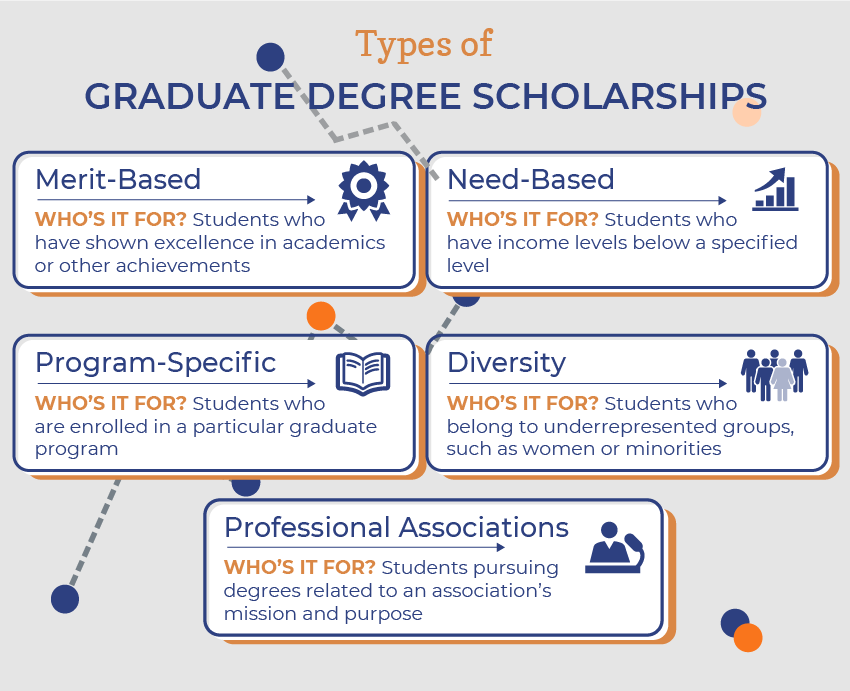Cracking the Code: My Journey to Fully Funded Graduate School Scholarships
Hey there, future scholar! Pull up a chair, because I want to share a story with you. It’s a story about a dream, a whole lot of worry, and how I eventually found my way to graduate school without drowning in student loans. If you’ve ever looked at the tuition fees for a Master’s or PhD program and felt that familiar knot in your stomach, thinking, "How on earth will I afford this?", then you’re exactly where I was not too long ago.
A graduate degree felt like a distant star – bright, desirable, but seemingly out of reach. I mean, who has that kind of money just lying around? My undergraduate years had already left me with a respectable amount of debt, and the thought of piling more on top for another two, four, or even six years of study was genuinely terrifying. But here’s the secret I learned: it doesn’t have to be that way. Graduate school scholarships, fellowships, and assistantships are real, and they are your golden ticket.
The Great Funding Quest Begins: My "Aha!" Moment
I remember countless sleepless nights, staring at university websites, my cursor hovering over the "Apply Now" button, only to pull back. The cost always got me. Then, one day, while scrolling through a forum (yes, an online forum!), I stumbled upon someone talking about their "fully funded PhD." Fully funded? What was that magic?
It was like a light switch flipped in my brain. It wasn’t just about getting into grad school; it was about getting paid to go to grad school, or at least having most of the costs covered. This was my "aha!" moment. My focus shifted from just applying to finding ways to make it financially feasible. And let me tell you, that shift changed everything.
Scholarships Aren’t Just for Superheroes: Dispelling a Myth
Before we dive into the nitty-gritty, let’s clear something up. For a long time, I thought scholarships were only for the absolute brainiacs, the Nobel Prize winners in waiting. I thought my grades were good, but not that good. My research experience was decent, but not groundbreaking. Sound familiar?
Well, here’s the truth: while academic excellence certainly helps, graduate school scholarships aren’t solely based on your GPA. They look at the whole package: your potential, your passion, your unique experiences, and how well you fit with a particular program or professor’s research. Many scholarships are specifically designed to support diverse backgrounds, specific research interests, or even those with demonstrated leadership skills. So, toss that "I’m not smart enough" thought right out the window!
Where to Dig for Gold: Unearthing Scholarship Opportunities
Finding these opportunities can feel like a treasure hunt, but with the right map, you’ll get there. Here’s where I started my digging, and where you should too:
- University Websites (Your First Stop): This is absolutely crucial. Every university department you’re interested in will likely have a "Funding," "Financial Aid," or "Graduate Admissions" section. Look for:
- Departmental Scholarships/Fellowships: Many departments offer their own funding packages, often tied to specific research areas or faculty members.
- Teaching Assistantships (TAs): You help teach undergraduate courses, grade papers, or hold office hours, and in return, you get a stipend and often a tuition waiver. This is how I got my footing!
- Research Assistantships (RAs): You work directly with a professor on their research project. This is fantastic for gaining experience and often comes with similar benefits to TAs.
- University-Wide Fellowships: These are competitive awards given by the university itself, often based on merit or specific criteria (e.g., diversity fellowships, fellowships for interdisciplinary research).
- External Scholarship Databases: Don’t limit yourself to just the universities! Many organizations, foundations, and governments offer scholarships. Websites like:
- ScholarshipPortals
- Fastweb
- ProFellow
- Grants.gov (for US federal funding)
- Country-specific government scholarship portals (e.g., Fulbright, Chevening, DAAD)
Are excellent places to start. Filter by your field of study, nationality, and academic level.
- Professional Organizations: Is there a professional association for your field (e.g., American Psychological Association, Institute of Electrical and Electronics Engineers)? Many of these offer grants or scholarships to graduate students in their discipline. Check their websites!
- Your Current/Former University’s Career Services: Sometimes they have resources or connections you might not think of.
- Network, Network, Network! Talk to your undergraduate professors, mentors, or anyone currently in graduate school. They might know about hidden gems or specific faculty who have funding for new students.
Understanding the Scholarship Lingo: TA, RA, and Fellowships Explained
When you’re sifting through opportunities, you’ll encounter a few common terms. It’s good to know what they mean:
- Fellowships: These are typically pure awards, meaning you don’t have a work obligation attached to them. They often come with a stipend and a tuition waiver, allowing you to focus entirely on your studies and research. They’re highly competitive.
- Teaching Assistantships (TAs): As I mentioned, you assist professors with teaching duties. This is a common form of funding, especially for Master’s students and early PhD candidates. It’s a great way to develop teaching skills.
- Research Assistantships (RAs): You work on a professor’s research, which could involve anything from data collection and analysis to literature reviews and lab work. RAs are often integrated into a professor’s grant funding. This is fantastic if you want to dive deep into research.
- Stipend: This is the living allowance you receive. It’s not a salary in the traditional sense, but it’s meant to cover your living expenses like rent, food, and utilities.
- Tuition Waiver/Remission: This means the university covers your tuition costs. This is often the biggest chunk of the financial puzzle and a key component of most fully funded offers.
My Secret Sauce: Tips for a Winning Application
Okay, so you’ve found some potential scholarships. Now comes the crucial part: making your application stand out. This is where I poured my heart and soul, and I believe these steps made all the difference for me:
- Start Early, Like, Really Early: Trust me, this isn’t a race you want to start at the last minute. Scholarship deadlines often come before admission deadlines. Give yourself ample time to research, write, revise, and gather all necessary documents.
- Tailor Everything: This is perhaps the most important tip. Do not send generic applications. Each scholarship, each program, each professor has specific interests.
- Read the prompt carefully: What are they looking for?
- Research the faculty: If you’re applying to a specific program, identify professors whose research aligns with yours. Mention them specifically in your Statement of Purpose (SOP).
- Connect the dots: Explain why you are a perfect fit for this specific scholarship or program. How do your past experiences, skills, and future goals align with their mission?
- Craft a Compelling Story (Your Statement of Purpose/SOP): Your SOP isn’t just a formality; it’s your story. This is where you connect your past experiences, academic journey, and future aspirations.
- Show, don’t just tell: Instead of saying "I am passionate about X," describe a specific project or experience that demonstrates that passion.
- Be specific: What research questions intrigue you? What skills have you developed? What do you hope to achieve in grad school and beyond?
- Highlight your unique perspective: What makes you, you?
- Proofread like your life depends on it. Seriously. Get multiple eyes on it.
- Get Strong Letters of Recommendation: Choose recommenders who know you well and can speak to your academic abilities, research potential, work ethic, and character.
- Ask early: Give them plenty of time.
- Provide them with materials: Your resume, SOP draft, and the scholarship description. Make it easy for them to write a glowing letter.
- Show Your Research Fit (Especially for PhDs): If you’re aiming for a research-intensive program (especially PhDs), demonstrating that your research interests align with a particular faculty member is key. Professors often have grant money to fund students who will work on their projects. Reaching out to potential supervisors before applying can sometimes even secure you an informal "offer" of funding.
- Be Persistent and Patient: This process can be long and sometimes disheartening. You might face rejections. That’s okay. Learn from them, refine your approach, and keep applying. My first few attempts didn’t land me anything, but I kept pushing.
The Sweet Taste of Success: My Fully Funded Experience
After months of painstaking work, countless revisions, and a few nail-biting interviews, I finally got that email. The one that said, "Congratulations! We are pleased to offer you admission with a full Teaching Assistantship, including a tuition waiver and a monthly stipend."
Pure elation. The knot in my stomach untangled itself, and a huge wave of relief washed over me. I wasn’t just admitted; I was funded. My dream was no longer a distant star; it was a tangible reality. The TAship meant I was contributing to the department, gaining valuable teaching experience, and most importantly, learning without the crushing burden of debt. It allowed me to focus on my studies, immerse myself in research, and truly thrive.
Your Journey Starts Now: Don’t Let Cost Stop You
My story isn’t unique, and it certainly isn’t impossible for you. Graduate school scholarships are out there, waiting for someone like you to discover them. Don’t let the price tag deter you from pursuing your academic dreams. With careful planning, thorough research, and a compelling application, you absolutely can find the funding you need.
It takes effort, yes, but the payoff is immense: the opportunity to delve deeper into a subject you love, to contribute to new knowledge, and to advance your career, all without the overwhelming stress of financial hardship.
So, take a deep breath. Start your research today. Tailor those applications. Ask for help. And remember, the journey to a fully funded graduate degree is challenging, but incredibly rewarding. You’ve got this!



